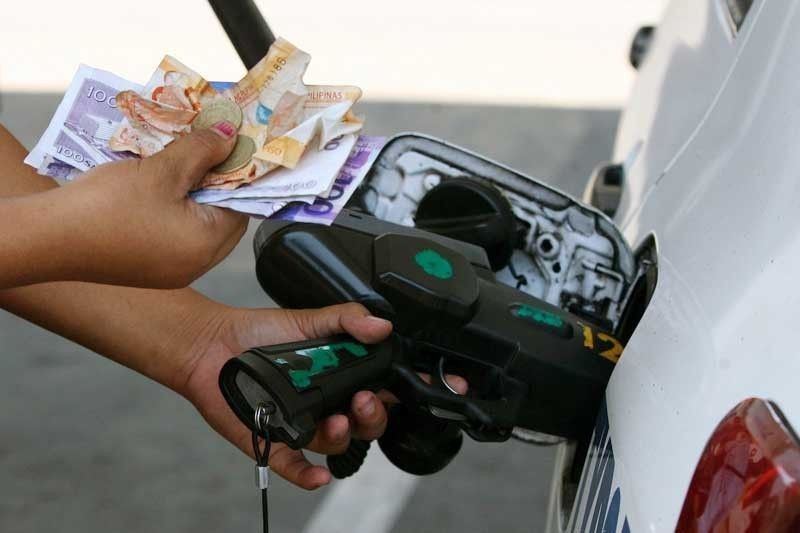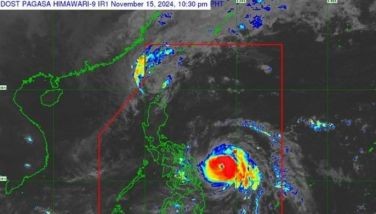DOF to suspend fuel tax hike

But existing excise tax stays
MANILA, Philippines — The scheduled increase of excise taxes on diesel and gasoline next year is expected to be suspended as global prices of crude oil are expected to exceed $80 per barrel in the last quarter of the year, according to Department of Finance (DOF) officials.
Finance Secretary Carlos Dominguez said President Duterte will soon order the suspension of the increase in excise taxes for diesel and gasoline, which is allowed under the Tax Reform for Acceleration and Inclusion or TRAIN law.
But the existing excise tax, imposed since January this year, will not be suspended or reduced, as called for by several quarters that blame the fuel tax for high inflation.
Under the TRAIN, only the next round of increases will be suspended when the average price of crude breaches $80 per barrel in the last three months preceding the scheduled tax hike.
At present, the government collects an excise tax of P2.50 per liter of diesel and P7 per liter of gasoline. By Jan. 1, 2019, the excise tax on diesel will increase to P4.50 per liter, and on gasoline to P9 per liter.
Dominguez said the announcement would be made ahead of the official review that is supposed to be made by the DOF on the average price of Dubai crude in the last quarter.
“This announcement is being made two months before the time required by law, to proactively anchor inflation expectations and enhance the welfare of the Filipino people,” Dominguez said.
“After consulting the leadership of both the Senate and House of Representatives, as well as the economic team, the President is confident that this course of action will help anchor inflation expectations for the coming year, allow the public to manage their finances better, and disallow hoarders and profiteers from taking advantage of the situation,” he said.
Senators of the majority bloc have urged Duterte to suspend the increases in excise taxes on petroleum products for 2019 and 2020 as mandated by the TRAIN law.
A letter to the President on Oct. 9, signed by 17 lawmakers led by Senate President Vicente Sotto III, stated that since January this year, pump prices for diesel and gasoline have increased 29 times, leading to a total increase of P12.15 and P11.40 per liter, respectively.
Dominguez said the current price and multiple estimates of crude prices over the next two months show the average price will stay above the $80 threshold, “and it is therefore being announced early that the suspension mechanism will be activated.”
Finance Assistant Secretary Antonio Lambino said the average Dubai crude based on Mean of Platts Singapore is expected to exceed the trigger price for suspension of excise taxes under the Tax Reform for Acceleration and Inclusion (TRAIN) Law.
“If you look at the futures market, it’s exceeded $80 so it’s very likely the next tranche (of increase in excise taxes) will be suspended,” Lambino told dzBB.
“It’s in the law so the taxing authority of Congress will really be implemented. They approved it, the mechanism is there so it’s very likely that suspension mechanism will be implemented,” he said.
Lambino said the government is already looking for projects that can be put on hold since the suspension is estimated to deprive the government of P40 billion in fresh revenues.
However, he asked the public to “manage their expectations” since suspending the next round of increases in excise taxes of petroleum products would not necessarily mean prices of commodities would go down significantly.
Based on DOF calculations, for every increase P100 increase in production costs, TRAIN contributed only about P6 to P10, he said.
“Ninety percent of the increases (in prices of commodities) would have happened anyway even without TRAIN and there would be no higher take-home pay,” Lambino said.
He also explained that based on data, the fastest inflation acceleration was on food, while non-food items decelerated.
Food inflation was triggered mostly by supply problems such as failure of the National Food Authority to buy local rice at harvest while importing rice at the wrong time.
Lambino said the President was confident that the announcement on the suspension of excise tax increase would help anchor inflation expectations for the coming year, allow the public to manage their finances better, and disallow hoarders and profiteers from taking advantage of the situation.
“The prices of basic goods have gone up and the government recognizes that those who have been affected the most are poor Filipino families who likewise need the most help,” the finance official said.
“It is for this reason that the President issued Administrative Order 13 and a series of Memorandum Orders to stabilize prices and the supply of basic agricultural products for all Filipino consumers,” Lambino added, referring to the order removing non-tariff barriers and streamlining procedures on the importation of agricultural products.
Malacañang said it is open to suspending the increase in excise taxes on oil even if this could lead to billions in foregone revenues.
Presidential aide Christopher Go said the impact of rising prices on the poor would be the government’s primary consideration in deciding whether to put on hold the next round of oil excise tax hike.
He said the administration would also consider factors like the revenue impact of the proposal and the effects of inflation in making a decision.
“I heard that a resolution has been filed in the Senate calling for the suspension of excise tax increase due to high inflation. We are open to it but we have to consider what is in the TRAIN Law,” Go said in a statement yesterday.
“We are balancing everybody’s interest. We are considering the fact that the suspension of the excise tax increase would lead to maybe about P40 billion loss for the government. But despite the situation, the primary consideration of the government is the effects (of higher prices on) our poor countrymen,” he added.
There was confusion yesterday after Go said the President has signed a document suspending the excise taxes on oil.
“The President and the executive department are now looking into the temporary suspension of the next increase of oil excise tax rates in 2019. This is scheduled to be imposed by January of next year as mandated by the TRAIN law but to arrest the rising price of oil and its effects on the inflation rate, we will defer implementing it until the right time,” Go said during an agriculture event in Taguig yesterday.
Go later clarified the President signed a document certifying as urgent the immediate enactment of the rice tariffication bill, replacing quantitative restriction on rice imports with a tariff.
The passage of the bill is expected to improve availability of rice, address artificial rice shortages, and reduce the prices of the staple.
Go added the President is monitoring the prices of oil and other commodities to mitigate the effect of inflation, which hit a record-high 6.7 percent last month.
“The government is looking into all available options to cushion the effects of rising oil prices,” Go said.
Urgent call
In their resolution, the senators said Dubai crude oil prices have already breached the $80 per barrel threshold in the first week of this month, while average price of London Brent crude has reached $84.96 in the same period.
Such figures are practically double the oil prices prevailing when the TRAIN Law was enacted on Dec. 19, 2017, they said.
“Hence, considering that the high crude oil prices are projected to continue increasing, we respectfully request your Excellency, and DOF Secretary Carlos Dominguez III to support our initiatives to suspend any further increases in excise taxes on diesel, gasoline and other petroleum products before the TRAIN Law’s ‘trigger period’,” the letter read.
Aside from Sotto, the letter was signed by Senate President Pro Tempore Ralph Recto, Majority Leader Juan Miguel Zubiri, Sonny Angara, Nancy Binay, Joseph Victor Ejercito, Francis Escudero, Sherwin Gatchalian, Richard Gordon, Gregorio Honasan, Panfilo Lacson, Loren Legarda, Manny Pacquiao, Aquilino Pimentel III, Grace Poe, Joel Villanueva and Cynthia Villar.
Senators from the minority bloc led by Sen. Franklin Drilon, however, cited Sen. Paolo Benigno Aquino IV as one of the prime movers of the suspension.
They said the move to suspend the increase was a victory for Aquino and the bloc.
“This is a victory for the minority bloc and this would help in our push to remove the excise taxes,” the minority bloc said in a statement.
Aquino earlier filed Senate Bill 1798, seeking to suspend the collection of excise tax on fuel once inflation rate breaches the annual inflation target over a three-month period.
For its part, the minority has filed a joint resolution suspending the excise tax under the TRAIN Law and mandating the rollback of levy on fuel to Dec. 31, 2017 rates. – With Alexis Romero, Mary Grace Padin, Gilbert Bayoran
- Latest
- Trending



























